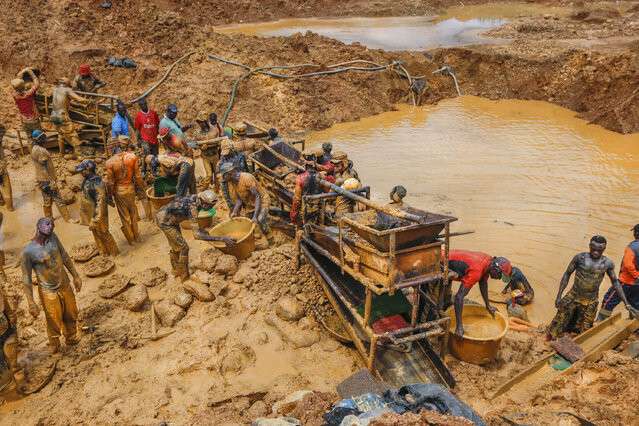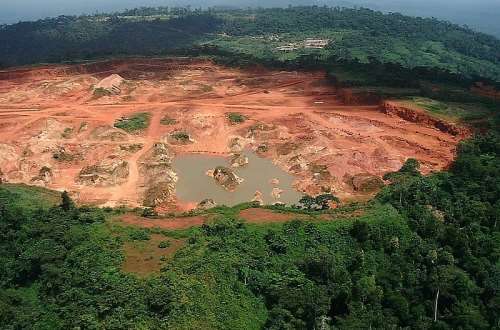Mr. Nicholas Opoku, a lawyer, governance policy analyst, and former staff of CDD-Ghana, has argued that galamsey is not primarily a legal issue, but a political one.
Opoku believes the ratification of new licenses by Parliament is irrelevant, as laws are not enforced simply because it is not politically expedient for bureaucrats and their political appointees.
According to him, the real challenge lies in addressing the political economy of galamsey, which could be tackled through electoral reforms, judicial intervention, or civic action.
“The rationale for parliamentary scrutiny in transactions involving natural resources is to enhance transparency and expansive participation in matters involving such resources and ensure value for money.
“It is to that end that the Ghana Supreme Court affirmed the constitutional requirement that transactions involving grants/concessions by GoG for the exploitation of mineral/water/natural resources must be scrutinized and approved (ratified) by Parliament (Ndebugri v. AG (2016))”.
Nick Opoku
Lawyer Nick Opoku highlighted that in Ghana, parliamentary scrutiny of public agreements is often superficial.

He explained that while many agreements, particularly those involving natural resources, require thorough examination, they are frequently rushed, leading to overlooked technical flaws.
He cited the 2016 case where two major Development Agreements between the Government of Ghana and Gold Fields Ltd. subsidiaries were submitted to Parliament just five days after signing.
Despite the agreements being complex and detailed, they were tabled for discussion the next day, and Parliament approved them in just 10 minutes.
Opoku noted that the entire process, from signing to ratification, took only six days for agreements that would govern a key natural resource for the next decade.
Regulatory Compliance Beyond Parliamentary Oversight
Lawyer Nick Opoku further explained that while parliamentary ratification is important, it is just one component of a comprehensive legal framework intended to protect Ghanaians’ interests in the management and exploitation of natural resources.

He emphasized that, aside from parliamentary oversight, other regulatory compliance measures are equally crucial.
Opoku pointed out that there are at least seven domestic laws aimed at protecting water bodies and the environment from the negative impacts of mineral, water, and natural resource exploitation.
“[These include] (i) Environmental Protection Agency Act, 1994 (Act 490); (ii) Water Resources Commission Act, 1996 (Act 522); (iii) Community Water and Sanitation Agency Act, 1998 (Act 564); (iv) Water Use Regulations, 2001 (L.I 1692); (v) Drilling Licence and Groundwater; Development Regulations, 2006 (L.I 1827); (vi) The Environmental Assessment Regulations, 1999 (L.I 1652); and (vii) Minerals and Mining Act, 2006 (Act 703). This is not an exhaustive list”.
Nick Opoku
Opoku explained that under Act 522, the Water Resources Commission must approve comprehensive water conservation plans before water rights are granted.
He emphasized that altering or polluting a water resource is illegal, with penalties of up to two years in prison or a GHS 6,000 fine.
He also highlighted that the Minister for Works and Housing, under Act 522, can designate an area as a protected catchment if a water deficiency is identified or threatened.
Additionally, Opoku noted that the EPA, under Act 490, is responsible for establishing standards and guidelines for water and environmental pollution, including waste discharge and the control of toxic substances. “Mining is listed under L.I 1652, as an activity for which an environmental impact assessment is mandatory prior to grant/approval of a license”.

Addressing other regulatory frameworks, the governance analyst highlighted that an environmental permit is required for mining under L.I 1652.
He stated that the Forestry Commission, under Act 571, oversees forest reserves and protected areas.
Additionally, Opoku pointed out that certain water use privileges granted to mineral rights holders under Section 17 of Act 703 require approval from the Water Resources Commission under Act 522.
He noted that the compliance requirements in these laws are extensive, and if the state bureaucracy effectively managed and enforced them as mandated, the issues of illegal mining (galamsey) and the impending water crisis would not be as severe.
Opoku emphasized that various international instruments also obligate the state to protect and preserve water bodies from pollution and significant harm.
This, he argued, reinforces that the issue of galamsey is political and highlights the need for political will to address it effectively.
READ ALSO: France, Italy Demand Explanation On UN Peacekeepers Attack




















